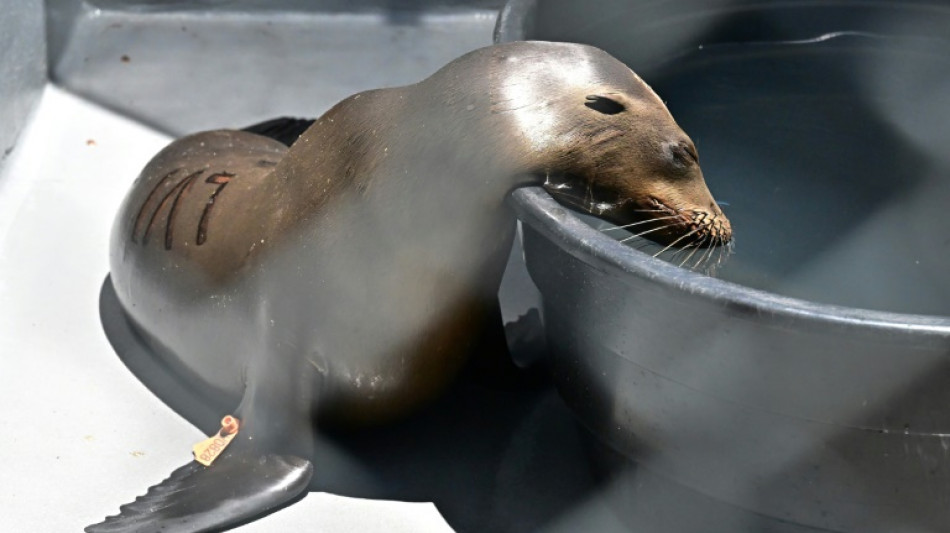
-
 The papabili - 15 potential successors to Pope Francis
The papabili - 15 potential successors to Pope Francis
-
Zhao sets up all-China clash after beating 2024 world snooker finalist Jones

-
 Ostapenko stuns Sabalenka to win Stuttgart title
Ostapenko stuns Sabalenka to win Stuttgart title
-
Argentina mourns loss of papal son

-
 African leaders praise Pope Francis's 'legacy of compassion'
African leaders praise Pope Francis's 'legacy of compassion'
-
Mehidy's five wickets help Bangladesh fight back in first Zimbabwe Test

-
 'The voice of god': Filipinos wrestle with death of Pope Francis
'The voice of god': Filipinos wrestle with death of Pope Francis
-
Prayers, disbelief in East Timor after Pope Francis death

-
 Real Madrid hold minute's silence as La Liga mourns Pope Francis
Real Madrid hold minute's silence as La Liga mourns Pope Francis
-
World leaders pay tribute to Pope Francis, dead at 88

-
 World leaders react to the death of Pope Francis
World leaders react to the death of Pope Francis
-
Zimbabwe lead first Test despite Bangladesh spinner Mehidy's five wickets

-
 Vatican postpones sainthood for 'God's influencer' after pope's death
Vatican postpones sainthood for 'God's influencer' after pope's death
-
Pope's death prompts CONI to call for sporting postponements, minute's silence

-
 Stunned and sad, faithful gather at St Peter's to remember Francis
Stunned and sad, faithful gather at St Peter's to remember Francis
-
Asian scam centre crime gangs expanding worldwide: UN
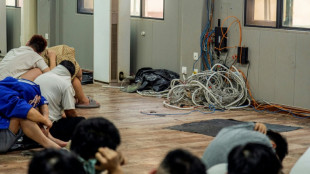
-
 Davos meet founder Klaus Schwab steps down from WEF board
Davos meet founder Klaus Schwab steps down from WEF board
-
Himalayan snow at 23-year low, threatening 2 billion people: report
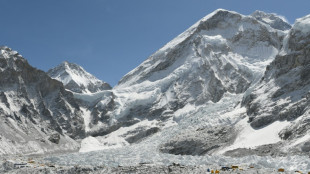
-
 The beautiful game: Pope Francis's passion for football
The beautiful game: Pope Francis's passion for football
-
Clerical sex abuse: Pope Francis's thorniest challenge

-
 Pope Francis's delicate ties with politics in Argentina
Pope Francis's delicate ties with politics in Argentina
-
Russia resumes attacks on Ukraine after Easter truce

-
 Pope Francis has died aged 88
Pope Francis has died aged 88
-
Gaza civil defence describes medic killings as 'summary executions'
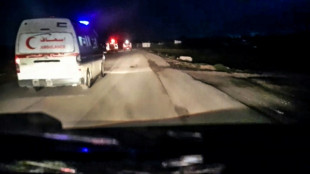
-
 Francis: radical leader who broke the papal mould
Francis: radical leader who broke the papal mould
-
Oscar stars, Max keeps mum, Sainz alive - Saudi GP talking points

-
 Iyer, Kishan win back India contracts as Pant's deal upgraded
Iyer, Kishan win back India contracts as Pant's deal upgraded
-
Vance lands in India for tough talks on trade

-
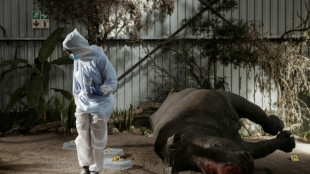 Inside South Africa's wildlife CSI school helping to catch poachers
Inside South Africa's wildlife CSI school helping to catch poachers
-
Nigerian Afrobeat legend Femi Kuti takes a look inward

-
 Kim Kardashian: From sex tape to Oval Office via TV and Instagram
Kim Kardashian: From sex tape to Oval Office via TV and Instagram
-
Vance in India for tough talks on trade

-
 Thunder crush Grizzlies as Celtics, Cavs and Warriors win
Thunder crush Grizzlies as Celtics, Cavs and Warriors win
-
Vance heads to India for tough talks on trade

-
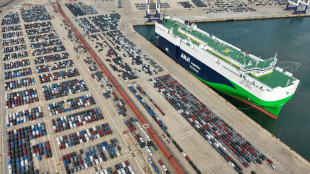 China slams 'appeasement' of US as nations rush to secure trade deals
China slams 'appeasement' of US as nations rush to secure trade deals
-
'Grandpa robbers' go on trial for Kardashian heist in Paris

-
 Swede Lindblad gets first win in just third LPGA start
Swede Lindblad gets first win in just third LPGA start
-
Gold hits record, dollar drops as tariff fears dampen sentiment
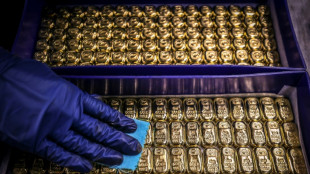
-
 As Dalai Lama approaches 90, Tibetans weigh future
As Dalai Lama approaches 90, Tibetans weigh future
-
US defense chief shared sensitive information in second Signal chat: US media

-
 Swede Lingblad gets first win in just third LPGA start
Swede Lingblad gets first win in just third LPGA start
-
South Korea ex-president back in court for criminal trial

-
 Thunder crush Grizzlies, Celtics and Cavs open NBA playoffs with wins
Thunder crush Grizzlies, Celtics and Cavs open NBA playoffs with wins
-
Beijing slams 'appeasement' of US in trade deals that hurt China
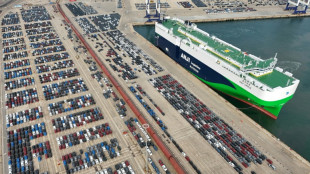
-
 Trump in his own words: 100 days of quotes
Trump in his own words: 100 days of quotes
-
Padres say slugger Arraez 'stable' after scary collision

-
 Trump tariffs stunt US toy imports as sellers play for time
Trump tariffs stunt US toy imports as sellers play for time
-
El Salvador offers to swap US deportees with Venezuela

-
 Higgo holds on for win after Dahmen's late collapse
Higgo holds on for win after Dahmen's late collapse
-
Moolec Science Enters Into Transformational Transaction Expanding Across Multiple Technology Platforms


Marine animal poisonings overwhelm California volunteers
Denise Christ regularly comes across injured wildlife in her work rescuing beached or stranded marine mammals along the California coast.
But she's been shocked by the hundreds of sea lions and dolphins found on the shore in recent weeks, dead or dying from neurotoxin poisoning.
"Heartbreaking, to say the least," said Christ, the Ventura County stranding coordinator for the Channel Islands Marine and Wildlife Institute (CIMWI).
The animals were sickened by domoic acid, a neurotoxin produced by algae that are a food source for fish, which are then eaten by sea lions and dolphins.
Algal blooms are not unusual this time of year, but this summer's crisis follows another one less than a year ago, alarming and overwhelming the CIMWI team based about 120 miles (190 kilometers) north of Los Angeles.
"We had a pretty intense bloom last summer but this year is way worse than we've ever seen in the 35 years I've been practicing marine mammal medicine," said Sam Dover, the executive director and cofounder of CIMWI.
Added Ken Hughes, Christ's colleague in neighboring Santa Barbara County: "We had over 300 sea lions up on the beach. And over 150 dolphins that also were affected by it. It was just so sad."
- 'New reality' of climate change -
There is no official explanation for the outbreak, but experts have several theories.
Algal blooms are fed by agricultural runoff, and this year California experienced heavier than normal rainfall.
"So there's a lot more runoff from the whole state, not just from the local regions," Dover said.
Others from the institute said warming oceans due to climate change were spurring algae growth.
"I believe it is the new reality and things are changing. The ocean's changing," Christ said.
When sea lions consume the toxin, they suffer neurological effects that include disorientation, foaming at the mouth, head bobbing and seizures.
"They basically don't know they're a sea lion. They don't know where they're at or what they're doing," Hughes explained.
The animals will head for the shore, where they wander erratically, attracting the attention of beachgoers.
Dover said last year's domoic acid outbreak took place in mid-August, but this year his group started getting calls reporting stricken animals in late May.
"We started getting one animal a day. So we knew it was coming," he said.
"And then on June 8, literally the floodgates opened and animals just started showing up everywhere," Dover said.
"This is definitely the worst we've ever seen."
CIMWI rescued about 300 animals last year -- this year they were getting more than 300 calls each day.
- More than 100 dead dolphins-
Another unusual feature of this year's outbreak is dolphins getting sick and dying from the toxin, with Dover counting more than 110 of the mammals dead in recent weeks.
There is no cure for domoic acid poisoning, so the only way to treat the animals is with fluids, food, anti-seizure medicine and patience, the experts said.
Younger animals have a better chance of survival because they eat less fish than adults, and therefore consume less of the toxin.
"Those are the ones we're putting most of our efforts towards now and we're having some pretty good success in flushing out the toxin from their system," Dover said, as volunteers hose down spacious enclosures where the rescued sea lions eat fish, float in pools and nap.
Treating, housing and feeding the sick animals demands a lot of resources, and CIMWI stays afloat through a combination of government grants, donations and volunteer labor.
"Essentially, every day is a battle with the animals and with our finances," Dover said.
C.Kovalenko--BTB




